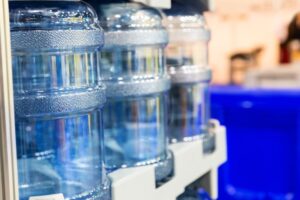What Are The Shelf Life Of Bottled Water?
The FDA doesn’t require the labeling of expiration dates on bottled water, but it does suggest that the plastic containers used for storing bottled water can degrade within two years. This can lead to a number of health issues including hormone-like chemicals leaching into the water which could impact a child’s growth and development. In addition, a chemical called antimony may be found in some bottled water bottles that have passed their two-year expiration date.
(Looking for water filtration systems for homes with wells? Contact us today!)

Bottled water typically has a shelf life of about two years when stored properly in cool conditions away from direct sunlight. If stored in an environment with high levels of heat, however, the shelf life can be significantly reduced.
If the bottled water is exposed to excessive heat, it can also cause the plastic to break down and allow the chemicals to leak into the liquid. This can lead to a number of serious health concerns such as cancer, hormonal imbalances, kidney disease, and other issues.
When purchasing bottled water, make sure to select thick, quality bottles and avoid the commercially available “milk jug” type jugs that are designed to leak over time. The leakage of these bottles will create a mess in your home, and the milk residue left behind can also be harmful to your health.
Store bottled water in a cooler, dark place to maximize its shelf life. If you have a large collection of bottled water, it is also a good idea to store it in a container that will not take up too much room in your refrigerator or cupboard. This will help you to keep the bottles together and prevent them from getting damaged in storage.
A properly sealed and sanitized container will protect the bottles from the elements while allowing you to store them at room temperature. To do this, fill the container with water to the top and then add a small amount of unscented liquid household chlorine bleach to it. You will need 1/8 teaspoon (about 8 drops) of liquid chlorine bleach for every gallon of water that you plan on storing in the container.
It is best to store bottled water in a cooler or a fridge to maximize its shelf life, as it can develop a strange taste if it is left out on the counter or in the sun. It’s also a good idea to store bottled water in a separate, sealed container when not in use.
If you’re unsure about the shelf life of your bottled water, the most accurate way to find out is to consult your water provider or the manufacturer’s website. Most bottled water providers will provide you with a date that is based on when the water was first produced.
Expired water should be discarded and should never be consumed, as it is not safe for consumption. It can have a strange taste or smell and can be dangerous to your health if left out in the open for long periods of time.

